Gerald C. Liu – 3rd Sunday After Epiphany, January 22, 2017.
“I am Christ’s and So are You”
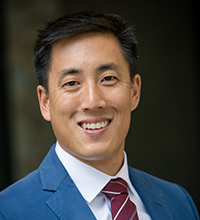 Give us grace, O Lord, to answer readily the call of our Savior Jesus Christ and proclaim to all people the Good News of his salvation, that no matter who runs the United States, we and the whole world may perceive the glory of his marvelous works; who lives and reigns with you and the Holy Spirit, one God, for ever and ever. Amen. (Book of Common Prayer, Collect for Year A, Third Sunday after Epiphany, modified by author.)
Give us grace, O Lord, to answer readily the call of our Savior Jesus Christ and proclaim to all people the Good News of his salvation, that no matter who runs the United States, we and the whole world may perceive the glory of his marvelous works; who lives and reigns with you and the Holy Spirit, one God, for ever and ever. Amen. (Book of Common Prayer, Collect for Year A, Third Sunday after Epiphany, modified by author.)
Now I appeal to you, brothers and sisters, by the name of our Lord Jesus Christ, that all of you be in agreement and that there be no divisions among you, but that you be united in the same mind and the same purpose.
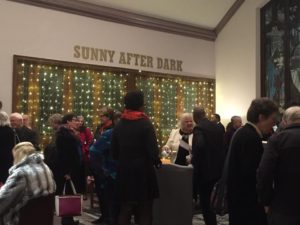 Well that sounds nice, doesn’t it? We’ve never had a disagreement in this church, have we? I remember at one of the parishes I formerly served in England, there was a weekend morning coffee gathering open to the public. It wasn’t quite as elaborate or hip as the Sunny After Dark coffee house. But it was a significant undertaking for a church comprised mostly of 60 and 70 year-olds. We were located on the “High Road,” which was a main shopping drag, not unlikeNassau St. We’d offer free coffee, tea (usually with milk and sugar) and biscuits (that’s Queen’s English for cookies) to people buying clothes for the kids or themselves or both, getting groceries, and taking care of any other weekend errands. And when everything was finished, as we were cleaning up, boy, if a single cup or saucer was placed on the wrong shelf, or the coffee maker or tea kettle were stored in the wrong cabinet, or if the chairs weren’t rearranged just as they previously were, (The church was small. So, we had moveable chairs in the sanctuary and used it for the social coffee time), you’d think that the world had ended. If anything was out of place, I’d get an earful from church members who were mad at the world.
Well that sounds nice, doesn’t it? We’ve never had a disagreement in this church, have we? I remember at one of the parishes I formerly served in England, there was a weekend morning coffee gathering open to the public. It wasn’t quite as elaborate or hip as the Sunny After Dark coffee house. But it was a significant undertaking for a church comprised mostly of 60 and 70 year-olds. We were located on the “High Road,” which was a main shopping drag, not unlikeNassau St. We’d offer free coffee, tea (usually with milk and sugar) and biscuits (that’s Queen’s English for cookies) to people buying clothes for the kids or themselves or both, getting groceries, and taking care of any other weekend errands. And when everything was finished, as we were cleaning up, boy, if a single cup or saucer was placed on the wrong shelf, or the coffee maker or tea kettle were stored in the wrong cabinet, or if the chairs weren’t rearranged just as they previously were, (The church was small. So, we had moveable chairs in the sanctuary and used it for the social coffee time), you’d think that the world had ended. If anything was out of place, I’d get an earful from church members who were mad at the world.
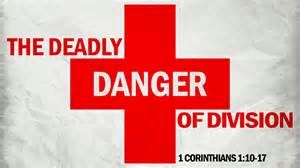 Now I appeal to you, brothers and sisters, by the name of our Lord Jesus Christ, that all of you be in agreement and that there be no divisions among you, but that you be united in the same mind and the same purpose.
Now I appeal to you, brothers and sisters, by the name of our Lord Jesus Christ, that all of you be in agreement and that there be no divisions among you, but that you be united in the same mind and the same purpose.
It sounds nice, doesn’t it?
Americans want great schools for their children, safe neighborhoods for their families and good jobs for themselves. These are just and reasonable demands of righteous people and a righteous public, but for too many of our citizens, a different reality exists:Mothers and children trapped in poverty in our inner cities, rusted-out factories scattered like tombstones across the landscape of our nation; an education system flush with cash but which leaves our young and beautiful students deprived of all knowledge; and the crime and the gangs and the drugs that have stolen too many lives and robbed our country of so much unrealized potential.This American carnage stops right here and stops right now.We are one nation, and their pain is our pain. Their dreams are our dreams, and their success will be our success. We share one heart, one home, and one glorious destiny.
Though the language exaggerates for effect, we can probably nod our heads to the sentiment. Some of our heads may begin to shake, however, at the next line – “The oath of office I take today is an oath of allegiance to all Americans.” Those words and the occasion where they were pronounced make us want to do something. We have to do something, like Mayor Liz Lempert did when she joined the women’s march in Trenton, NJ yesterday.  Maybe some of you were there too. In New York, where I live, there were reportedly 400,000 women, men, and children participating. Lempert told the Princeton Patch, “It is going to be more important than ever that people will stand up and be vocal about things important to them, and to use our collective voice to make a strong statement” (“Princeton Mayor to Participate in Women’s March in New Jersey” in The Princeton Patch, Anthony Bellano, January 19, 2017). Her speech isn’t empty. She isn’t merely saying what sounds good. Her appeal and action to empower social change gets at what Paul urges the Corinthians to do.
Maybe some of you were there too. In New York, where I live, there were reportedly 400,000 women, men, and children participating. Lempert told the Princeton Patch, “It is going to be more important than ever that people will stand up and be vocal about things important to them, and to use our collective voice to make a strong statement” (“Princeton Mayor to Participate in Women’s March in New Jersey” in The Princeton Patch, Anthony Bellano, January 19, 2017). Her speech isn’t empty. She isn’t merely saying what sounds good. Her appeal and action to empower social change gets at what Paul urges the Corinthians to do.
I Corinthians is a letter. It’s one of the longest in the New Testament. Paul writes it to a church he founded. He’s a seasoned minister at this point. He’s been proclaiming the gospel for about 20 years. He spent about a year and a half with the Corinthians and at the time of this letter, he hasn’t seen them for about three years. He’s in Ephesus. It’s as far away as Nova Scotia is from us. And even though he writes from a distance, there are pressing church problems that need addressing. We won’t get into the details today. Our focus this morning is his appeal that the Corinthians must unify.
Given all he’s been through with and apart from the Corinthians, when Paul makes an appeal for unity, he doesn’t speak from naïveté or blind faith. He isn’t articulating a platitude or wishful thinking.
He also isn’t just addressing the Corinthians. In verse 2 of chapter 1, he writes, “to the church of God that is in Corinth, to those who are sanctified in Christ Jesus, called to be saints, together with all those who in every place call on the name of our Lord Jesus Christ, both their Lord and ours.” He’s writing to all of us, including Princeton United Methodist Church, nearly two millennia later.
Still, how do we receive Paul’s words as true, especially today? And how do we live into them? We’re getting close when we as a church believe and declare, “All are Equal.” But that kind of declaration can seem unreal too.
All are equal? Continue reading “God Imagines…..All Are Equal – 1 Corinthians 1: 10-18”

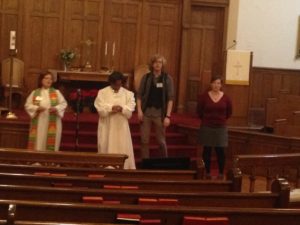 “God imagines…” signals a divine reality – a reality that exists already as far as God is concerned, although not quite yet as far as humans are concerned. “God imagines” is an invitation to enter a divine space called the Kingdom or the Reign of God, a place that holds the substance of the things we humans hope for, and dream of.
“God imagines…” signals a divine reality – a reality that exists already as far as God is concerned, although not quite yet as far as humans are concerned. “God imagines” is an invitation to enter a divine space called the Kingdom or the Reign of God, a place that holds the substance of the things we humans hope for, and dream of. 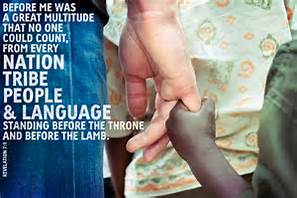 In
In  be more in number than the stars of the heaven or the sand of the sea. I think we’re looking at them here in Revelation. This is what New Testament scholar
be more in number than the stars of the heaven or the sand of the sea. I think we’re looking at them here in Revelation. This is what New Testament scholar 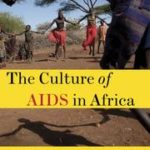
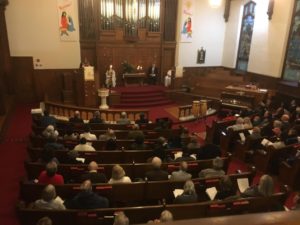 From many faiths and many backgrounds, we joined together to worship and pray and honor the work and ideals of Rev. Dr. Martin Luther King Jr. We were marching “in the light of God.”
From many faiths and many backgrounds, we joined together to worship and pray and honor the work and ideals of Rev. Dr. Martin Luther King Jr. We were marching “in the light of God.”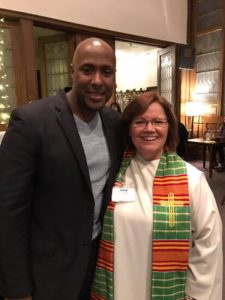
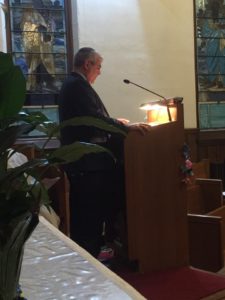
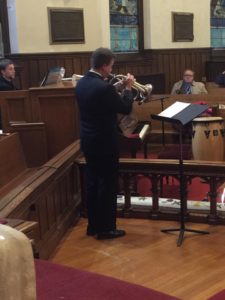
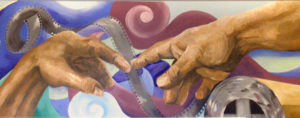


 The preacher, Minister William D. Carter , is also a singer-songwriter (
The preacher, Minister William D. Carter , is also a singer-songwriter (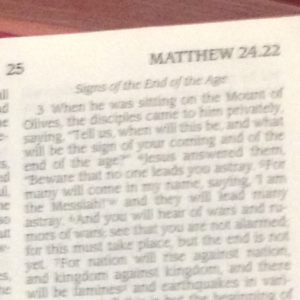 Is this passage anyone’s favorite passage of scripture? Heavy reading isn’t it? It takes me back to time spent with my conservative Baptist grandmother who often lamented that we were moving into the end times, the signs were all around us.
Is this passage anyone’s favorite passage of scripture? Heavy reading isn’t it? It takes me back to time spent with my conservative Baptist grandmother who often lamented that we were moving into the end times, the signs were all around us. The
The 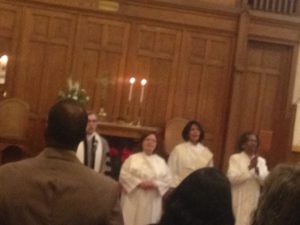 Lord, make me an instrument of thy peace;
Lord, make me an instrument of thy peace;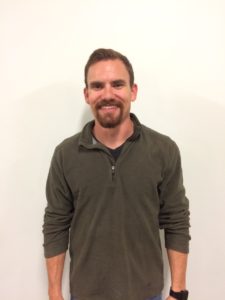 The youth program at PUMC includes multiple “Youth Staff” volunteers who dedicate their time to mentoring our teens. Most of these “Staff,” however, are new to PUMC. So, for the next few months we will showcase a short interview with each youth staff, allowing us to know a bit more about them and their passion for our youth. Hopefully this short piece will give you the courage to talk with them the next time you see them!
The youth program at PUMC includes multiple “Youth Staff” volunteers who dedicate their time to mentoring our teens. Most of these “Staff,” however, are new to PUMC. So, for the next few months we will showcase a short interview with each youth staff, allowing us to know a bit more about them and their passion for our youth. Hopefully this short piece will give you the courage to talk with them the next time you see them!